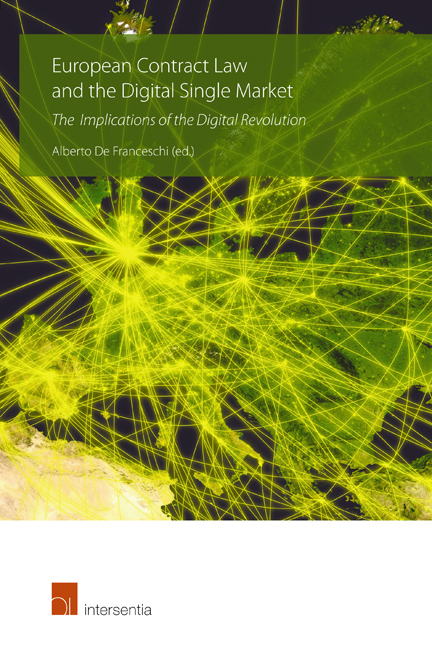Book contents
- Frontmatter
- Preface
- Contents
- List of Authors
- European Contract Law and the Digital Single Market: Current Issues and New Perspectives
- PART I THE IMPACT OF DIGITAL TECHNOLOGY ON PRIVATE LAW RELATIONSHIPS
- PART II DATA AS A TRADEABLE COMMODITY AND THE NEW INSTRUMENTS FOR THEIR PROTECTION
- PART III THE LEGISLATIVE INSTRUMENTS FOR A DIGITAL SINGLE MARKET
- PART IV NEW FEATURES OF STANDARD CONTRACTS IN THE DIGITAL MARKET
- Standard Terms and Transparency in Online Contracts
- Contracts Concluded by Electronic Means in Cross-Border Transactions. ‘Click-Wrapping’ and Choice-of-Court Agreements in online B2B Contracts
- PART V ONLINE PLATFORMS IN THE ‘SHARING ECONOMY’
Contracts Concluded by Electronic Means in Cross-Border Transactions. ‘Click-Wrapping’ and Choice-of-Court Agreements in online B2B Contracts
from PART IV - NEW FEATURES OF STANDARD CONTRACTS IN THE DIGITAL MARKET
Published online by Cambridge University Press: 12 December 2017
- Frontmatter
- Preface
- Contents
- List of Authors
- European Contract Law and the Digital Single Market: Current Issues and New Perspectives
- PART I THE IMPACT OF DIGITAL TECHNOLOGY ON PRIVATE LAW RELATIONSHIPS
- PART II DATA AS A TRADEABLE COMMODITY AND THE NEW INSTRUMENTS FOR THEIR PROTECTION
- PART III THE LEGISLATIVE INSTRUMENTS FOR A DIGITAL SINGLE MARKET
- PART IV NEW FEATURES OF STANDARD CONTRACTS IN THE DIGITAL MARKET
- Standard Terms and Transparency in Online Contracts
- Contracts Concluded by Electronic Means in Cross-Border Transactions. ‘Click-Wrapping’ and Choice-of-Court Agreements in online B2B Contracts
- PART V ONLINE PLATFORMS IN THE ‘SHARING ECONOMY’
Summary
INTRODUCTION
The European Commission has identified the completion of the Digital Single Market (DSM) as one of its main political priorities. The Commission's Website states that the
‘internet and digital technologies are transforming our world … It's time to make the EU's single market fit for the digital age – tearing down regulatory walls and moving from 28 national markets to a single one. This could contribute € 415 billion per year to our economy and create hundreds of thousands of new jobs.’
That sounds quite good. And again one is deeply impressed by the Commission's quantification skills: it is not €400 or €480 billion but rather €415 billion per year that moving to a single market could contribute to the European economy. However, according to the Commission's so-called Digital Single Market Factsheet, ‘obstacles remain to unlock these potentials’. In reality, cross-border online services seem to represent only a small percentage of overall EU online services. The Commission's website with reference to its priorities points out:
‘But at present, markets are largely domestic in terms of online services. Only 7% of EU small- and medium-sized businesses sell cross-border. This needs to change – putting the single market online.’
My focus in this article is on such cross-border contracts and specifically on what might be perceived as a barrier, a regulatory wall, or an obstacle, namely formal requirements in contracts concluded online.
There is little doubt that the way we conclude contracts today has dramatically changed as compared to 25 years ago. In the digital world, the formal requirements of a contract may seem to be a throwback to the old world, the non-digital world. By formal requirements I do not mean those specific ‘formal requirements’ for consumer contracts concluded by electronic means which are meant to enable consumers to be informed about all the costs before entering into a binding contract. In that regard, Article 8(2) of the Consumer Rights Directive introduced a so-called ‘button solution’ in order to provide sanctions for ‘internet cost traps’. Nor do I mean domestic contracts entered into by parties based in one jurisdiction. I mean cross-border contracts, the kind of contracts which the Commission has in mind when it complains about the largely domestic nature of markets in the context of the digital single market. But what is special about cross-border contracts in terms of formal requirements?
- Type
- Chapter
- Information
- European Contract Law and the Digital Single MarketThe Implications of the Digital Revolution, pp. 209 - 220Publisher: IntersentiaPrint publication year: 2016

